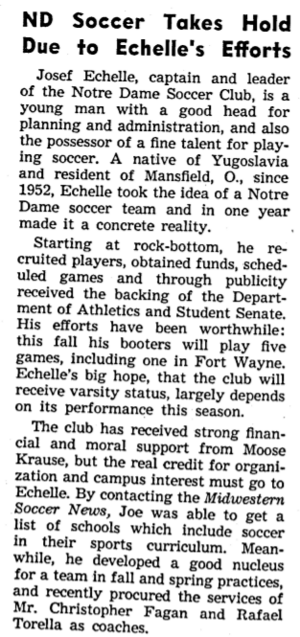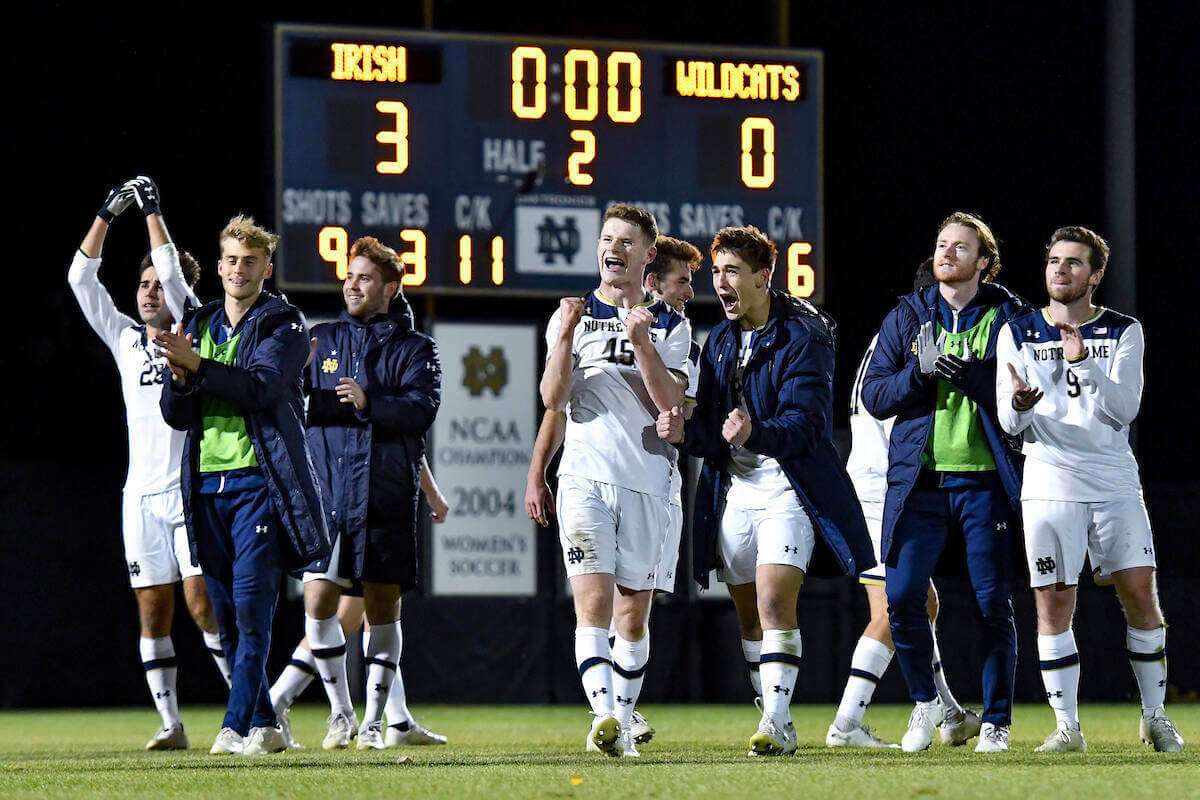Josef Echelle ’62 and Philip Quinton ’22 met on November 10 in Pittsburgh.
Quinton, one of the men’s soccer captains, and Echelle, who founded the program as a Notre Dame student 60 years ago, bonded over a shared commitment to the team and the school. Their otherwise disparate stories reflect the remarkable changes in American soccer since Echelle became the fledgling program’s first captain and coach, and the enduring Notre Dame tradition he established that players like Quinton uphold.
On the day Echelle saw them play, the Fighting Irish beat Pittsburgh to advance to the Atlantic Coast Conference tournament final, which they went on to win. The team took a chartered flight to Pittsburgh for that game. When the program was in its infancy in Echelle’s days, players traveled to Missouri for their biggest game by school bus.
Echelle, an immigrant from the former Yugoslavia, discovered soccer as a boy in an Austrian refugee camp in the 1940s, playing with a ball made from rags. The divided camp population of Yugoslavians, Austrians and other displaced German-speakers came together to play barefoot games with makeshift goal posts.

After eight years, Echelle’s family got the chance to immigrate to America after World War II through the Displaced Persons Act, and they landed in Mansfield, Ohio, where the young Echelle attended St. Peter’s Academy, eventually earning admission to the University in 1958.
Starting the team at Notre Dame in 1961, just two years after the first NCAA soccer championship, required all his resourcefulness and knowledge of how to maneuver through logistical red tape on campus.
“I was involved in student government and the Blue Circle Honor Society, so I sort of understood University operations and how things were organized,” Echelle says. “I think the thing that strikes me is we were entrepreneurial those years. We were starting with $0 and developing a major sport.”
In the six decades since, the sport has exploded in America and thrived at Notre Dame. There are over 1,800 college programs in the country. The Fighting Irish men’s team won the 2013 national championship and the women’s program has won three. And it all started in 1961 with a flyer.
“A copy of the football team’s,” Echelle says with a laugh. “The response was pretty good. Something like 40 people came out.”
Experience levels varied quite a bit, Echelle recalls. The strongest players came from outside the United States, and international students made up much of the eventual starting lineup.
According to the October 6, 1961 issue of Scholastic, players from Europe, Latin America, India and West Africa outnumbered their American counterparts. The international character of that first team reflects the sport’s demographics 60 years ago.
Preparations were a little frantic, Echelle recalls. “We didn’t have shoes,” he says. “We didn’t have towels. And the balls that the school ordered — they were very cooperative, but they ordered rubber balls.”
They played five games, four in South Bend, along with one exhibition in Fort Wayne, Indiana, opening with a crushing, 8-0 loss against powerhouse Saint Louis University. Echelle never worried about his players backing out.
“Perseverance” and “tenacity” defined the team’s spirit. They bounced back to win their next three games, beating Purdue 4-1 and shutting out Indiana Tech 4-0 and Goshen 1-0.
The following year, in the small town of Sikeston, Missouri, the Fighting Irish played what the team nicknamed the “Revenge Bowl” against Saint Louis, conquering their mighty foe, 3-0.
In 2021, Quinton says, that determined team spirit and commitment to improvement still distinguish Notre Dame from other soccer programs. “I think that’s the mark of a good program,” he says, “and the mark of Notre Dame soccer is that that happens continuously every single year.”
This year’s ACC tournament champions have a 13-5-3 record as they prepare for a NCAA round of 16 game on Sunday at home against Wake Forest.
“The goal in our program is always to win a national championship,” Quinton says, “and this year it’s no different.”

That’s a long way from what Echelle could have envisioned when he posted flyers seeking players. Today, competitive American youth leagues proliferate and securing a college soccer scholarship requires more travel and competition than the Fighting Irish program probably had in its first decade of existence.
“When I was in high school, there was a big transition towards these academy teams and away from playing for your high school or your club team,” Quinton says, but he preferred to play with local teams near his Portland, Oregon, home.
He missed out on many of the elite tournaments that college coaches usually attend. Instead, he attended camps at different universities and tried to cultivate one-on-one relationships with coaches.
At a University of Washington camp, Quinton met former Notre Dame coach Bobby Clark, who led the team to the 2013 title.
“I was even talking to (Chad Riley ’04), who’s our coach now, when he was still working at Dartmouth,” Quinton says. “Honestly, it came down between Dartmouth and Notre Dame, and after I chose here, Coach Riley came here, which was kind of the best of both.”
After meeting Quinton in Pittsburgh, Echelle said the young captain was “a really classy guy,” one who seemed to have a deep appreciation for the efforts of that first Irish team. The coaching staff always emphasizes the program’s legacy, Quinton says, and he feels grateful every time he takes the field for the hard work of men like Echelle.
“One of the mottos the team has is to leave the jersey in a better place,” Quinton says. “I think that’s kind of shaped the way this program has acted long before I got here, and it will continue long after I leave.”
Chris Parker, a senior studying classics and journalism, is this magazine’s fall semester intern.